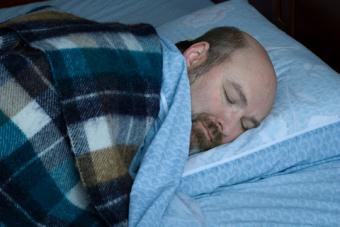
Sometimes you have more trouble staying asleep than falling asleep. If you go to sleep easily enough, but wake frequently, you may suffer sleep deprivation due to sleep disruption.
Have Trouble Staying Asleep?
Sleep is important, especially when you can't stay asleep. It can be frustrating to wake up repeatedly in the middle of your sleep cycle whether a baby, an animal or something else wakes you. The more disrupted your sleep is, the more likely you are to feel and act on the effects. Think of the baby who cannot sleep and how cranky he or she becomes. While adults are not prone to long, screaming jags because they want desperately to sleep - it can feel that way.
Some of the most common reasons why you might have trouble staying asleep include:
- Baby/Kids
- Pain
- Stress
- Worry
- Extreme temperature (hot/cold)
- Illness
- Leg cramps
- Snoring (Self/Spouse)
- Spouse movement, talking
- Noise
- Sleep disorder
The majority of these reasons are situational. Situational reasons will resolve on their own. For example, the baby waking you up all night will eventually learn how to sleep on his or her own. They will sleep through the night. The baby, like you, needs to learn to go back to sleep after waking in the night. Pain can be treated with pain medication or you will heal. If you're sick, you'll get better, noise can be reduced, and temperatures can be adjusted.
Snoring, leg cramps and sleep disorders are beyond the situational and may require medical intervention.
Sleep Solutions
Even if you identify the source of why you are waking up all night, you still need to find positive solutions to help you sleep and stay asleep. The first steps are to create a positive sleep environment where it's quiet, cool, comfortable and dark. Try not to eat two hours before going to sleep to reduce the chance that bodily functions will wake you in the middle of the night.
Create a bedtime ritual to help relax you. Take a long hot bath, read for a while and make sure the TV is turned off when you go to sleep. Sometimes, just having the TV on when you fall asleep can wake you later when the TV gets too noisy. Other sleep solutions include identifying if you have a sleep disorder or using OTC sleep aids.
Sleep Study
If you are having trouble sleeping and you suspect that it's a sleep disorder, you should consult your physician. They will order a sleep study in order to determine the nature of the sleep disorder. If your partner suffers from the disorder, you should encourage them to seek help.
Sleeping Pill
Sleep aids can help you for short periods of time when sleep is troubled by stress, noise or travel, but you should not rely on for long-term sleep support. You should always follow the directions on the OTC product and consult your physician or pharmacist with any questions. Melatonin is a hormone that tells your brain it's time to go to sleep. It's become very popular as a natural sleep aid, particularly for people who have chronic trouble going to or staying asleep.
Nothing Replaces a Good Night's Sleep
When it comes to your health, nothing substitutes for a good night's rest. If your sleep is disrupted occasionally, you will make up the sleep deficit on another night. If you are having trouble staying asleep chronically, you should identify why.







